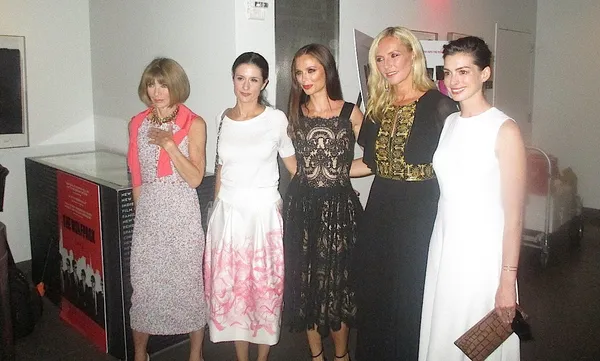 |
| Anna Wintour, Livia Firth, Georgina Chapman, Keren Craig and Anne Hathaway at The True Cost Photo: Anne-Katrin Titze |
Livia Firth is a committed activist who is looking towards the future. She is the founder of The Green Carpet Challenge, Creative Director of Eco-Age, and Oxfam Global Ambassador along with Bill Nighy, Helen Mirren, Annie Lennox, Desmond Tutu, Gael Garcia Bernal, Helena Christensen, and Colin Firth. At the Georgina Chapman, Harvey Weinstein, William Ivey Long, Cindy Sherman and Stella McCartney invitation screening of Andrew Morgan's The True Cost, organised by Peggy Siegal, Livia and I spoke about her role as The True Cost executive producer (credited as Livia Giuggioli), exposing myths, and what it means to connect the issues to work towards reversing brainwashing.
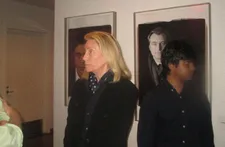 |
| Vogue Fashion Director Tonne Goodman: "I know Livia and I know how thorough she is…" Photo: Anne-Katrin Titze |
Isabella Rossellini, Yigal Azrouel, Ingrid Sischy, Sandra Brant, Stephanie LaCava, Tonne Goodman, Timo Weiland, Laura Piety, Julia Garner, Julia Loomis, Amy Fine Collins, Derek Blasberg, Gigi Mortimer, Michael Avedon, Steven Kolb, CEO of the Council of Fashion Designers of America, Anna Wintour, Giovanna Battaglia, Anne Hathaway, Adam Shulman, and Marchesa co-founders Georgina Chapman and Keren Craig were among those at the Film Society of Lincoln Center's Francesca Beale Theater screening, introduced by Livia and Andrew.
As Livia and I began our conversation, Alan Rickman, who was about to give a talk in an adjacent theatre, came by to say hello with a hug for Livia.
Anne-Katrin Titze: The film touches on many urgent issues concerning the fashion industry. How did you get involved in the film?
Livia Firth: I got involved because I’ve been campaigning about these issues for many years. And when Andrew decided to make the documentary two years ago, he sent me an e-mail in London, and said “I’m from Los Angeles, I want to make this documentary, I’m coming to London, can I come and interview you and see you?” And I said “sure.” So he came to the office with Michael [Ross], the producer, and we did the first interview.
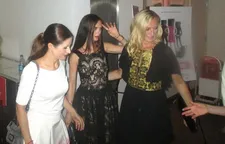 |
| Livia Firth with Marchesa co-founders Georgina Chapman and Keren Craig getting a hand Photo: Anne-Katrin Titze |
And then we started talking immediately. I loved Andrew’s approach to the whole issue, his curiosity and how much his mind was open to want to really understand the complexities. Because the fashion industry is such a huge, huge industry. It goes from agriculture to communication, so how do you address the issue? It’s not easy.
AKT: And the problems range from pollution to human rights violations.
LF: Exactly! I’m so glad that you’re saying that. One of the myths – and that’s what I’m going to say tonight [in her introduction to the film] – one of the myths that’s sold to us is that there are a lot of little boxes with lots of little issues. There’s the climate change issue, the human rights issue, the trade regulation issue, the poverty issue, the slavery issue, trafficking, economy issue, but in fact, they are all part of the same thing. And it’s all related.
AKT: The film makes the interconnectedness very clear.
LF: It is extraordinary the way that Andrew was able to really join the dots of everything. In the course of making this we met each other many times. We met in Copenhagen, in New York, in LA, in Milan, he came back to London to interview me and we’ve been talking all the time and I was constantly saying “oh you have to talk to this person or that.” So I acted a bit as the old aunt.
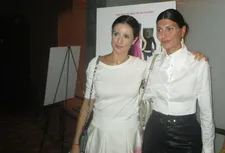 |
| Livia Firth with W Gio's Journal's Giovanna Battaglia: "It’s about how we are treating fashion in a disposable way." Photo: Anne-Katrin Titze |
AKT: Old aunt? You don’t come across old-auntish at all.
LF: Well, I’m much older than Andrew. And when he was finished and doing the cut, we spoke a lot and looked at the different cuts together.
AKT: Which issues do you think are the most pressing? What can audiences watching this film do to change things?
LF: Well, it’s the disposability today. It’s about how we are treating fashion in a disposable way. And fast fashion has brainwashed us, basically. Brainwashed us in thinking that it’s democratic to buy something under ten dollars. But, as we see in the movie, it’s the democracy of who? It’s not the democracy of the people who are becoming poorer and poorer because they are producing for us. And it’s not the democracy of the consumer who is becoming poorer and poorer because he is buying tons of crap, excuse me. And then, also, so if we slow down and start consuming in a different way, and give a little more thought on what we buy.
We buy on impulse today. And they think, what about people who have no money? What made the two owners of Zara and H&M be among the ten richest men in the world on the list that was published last week? It’s not poor people who can’t afford to buy clothes. It’s us that buy. When you go to 5th Avenue in New York or in London, or Milan, on a Saturday afternoon, you see hordes of people with shopping bags. These are not poor people. It is a myth! About the fast fashion brands, there was an article recently in The New York Times that said, “Is H&M becoming like a Starbucks?”
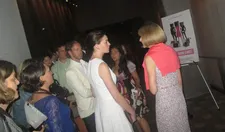 |
| Anne Hathaway speaking with Anna Wintour draws a crowd Photo: Anne-Katrin Titze |
There is an H&M at every corner in New York City. It’s up to us, the consumers. We have the power to change if only we started. There are very simple rules. When you buy something, you ask yourself, will I wear it a minimum of 30 times. If the answer is yes, you buy it. You’d be surprised how many people don’t wear something 30 times!
AKT: The shirt I am wearing tonight is inherited from my 98-year-old grandmother!
LF: Brava! Fantastic.
AKT: You are wearing a beautiful skirt. The Green Carpet Challenge is a wonderful way to bring awareness.
LF: This is by an Italian designer called Laura Strambi. She’s an eco-designer. She works with organic cotton and with recycled plastic bottle fiber. But the shoes are Prada and I have been wearing them for …
AKT: 29 times?
LF: Oh more!
 |
| Julia Garner in The True Cost mix Photo: Anne-Katrin Titze |
As Livia goes off to prepare for her introduction of The True Cost, I have a chance to speak with Vogue Fashion Director Tonne Goodman.
Anne-Katrin Titze: Are there any issues in the fashion industry that you think urgently need to be addressed?
Tonne Goodman: I’m here to see the film because I know how informative it will be. Because I know Livia and I know how thorough she is, how conscientious she is. I’m really looking forward to seeing the film and having it spelled out what we need to know. What all of us need to know, because I’m sure there are some issues that are more critical that need to be addressed before other ones.
AKT: It’s great that you are supporting this.
TG: Oh, yeah, absolutely I support it.
AKT: One of the ideas Livia just mentioned to me was that she suggests everyone only buy things they intend to wear at least 30 times.
TG: Well, that’s very easy. I wear a pair of white jeans every single day. So I can attest that I wear something more than 30 times!
 |
| Keren Craig and Giovanna Battaglia in support of The True Cost Photo: Anne-Katrin Titze |
Here is what Livia and Andrew said in their introductions:
Livia Firth: Thank you all for coming. This movie is very special. To me, to Andrew, but tonight it will be very special to you as well. We live in strange times. Particularly this year is a very, very important year. At the end of the year with COP 21 in Paris there are some big decisions to make. There are two myths that they are telling us. One is that we have lots of big problems in small boxes. There’s the climate change problem, the trade regulation problem, there is the poverty problem, the slavery problem, economy problem and so on. Well, guess what?
Every single day we do two things, we get dressed and we eat. Both industries touch on every single one of these little boxes. So we all can do something about it. Because what we put on every single day has consequences and repercussions. There are lots of hands behind this. And the kind of fashion that we promote, the industry most of you in this room work for, is a beautiful fashion. It’s fashion made of beautiful hands of memories, of investment.
Then there is another big problem, the other myth, they’ve been telling us, which is that it’s democratic to buy something with a price tag under ten dollars… Fashion and disposability shouldn’t be in the same sentence. It’s wrong. And as you will see tonight, this is what gives the proof. We have to thank Andrew Morgan and his team for having made a very, very powerful documentary.
Andrew Morgan: This film has been profoundly life changing for me. It was made with great trust and really enduring hope. The people you are about to hear from in this film chose to trust me to carry their stories to you in the hope that what we see and hear tonight will move us and really motivate us. Some of you in this room, I am very aware, are giving your lives to incredibly good things.
Your lives are moving us all forward and I hope that for so many of you tonight this is just a re-affirmation of why you do what you do the way you do. For others it’s possible tonight that maybe your eyes open a little wider and you realise that you have a tremendous amount of influence. And maybe we can all ask how we can use that influence. It’s really a deep honor to present to you The True Cost. Enjoy the film.
The New York Times' Breaking News this morning: Jim Yardley and Laurie Goodstein's Pope Francis, in Sweeping Encyclical, Calls for Swift Action on Climate Change.
Read what motivated Andrew Morgan to make The True Cost here.





















